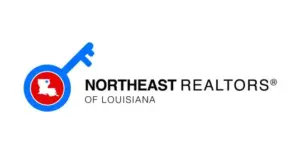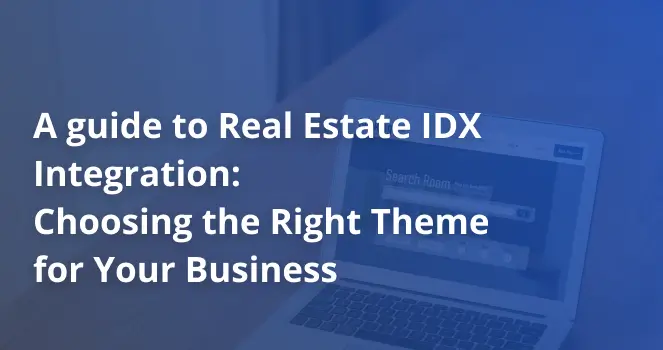Real estate IDX integration is becoming essential as nearly 44% of home buyers now start their property search online. This trend sends a clear message to real estate professionals: a basic static website with just a contact form is no longer sufficient.
What today’s buyers truly desire are websites that function as comprehensive platforms. These are sites where they can browse through fresh listings, get captured as leads, and experience the same smooth, polished interface they’ve grown accustomed to from major players like Zillow, Trulia, and Realtor.com.
And that’s precisely where IDX (Internet Data Exchange) integration becomes important. It connects your website directly to MLS data so that you can display current, up-to-date listings under your brand.
Now, are you choosing the right IDX provider and theme? That’s one of the most critical decisions you will make for your business, because these choices directly impact how reliable your site is, how fast it runs, how secure it stays, and ultimately, how successful it becomes.
Understanding IDX Technology
Here’s how IDX works:
It establishes secure connections (APIs) between MLS databases and your website. This setup ensures that property data flows through in real time, maintaining the accuracy and reliability of your listings.
Back then, some websites used these iframe solutions that simply embedded MLS data into the page. But here’s the problem with that approach: those pages weren’t considered part of your website, so search engines couldn’t properly index them for SEO purposes.
Modern IDX technology has solved this issue by generating what we call native web pages that actually boost your SEO performance while still serving your visitors effectively.
The adoption numbers speak for themselves: more than 1 million agents across over 100 different MLS markets are currently relying on IDX technology.
Most modern systems today are built on the RESO Web API standard, which has replaced the older RETS protocol we used to use. What’s excellent about RESO Web API is that it offers much faster synchronization, stronger security measures, and more consistent data formatting across the board.
It’s also significantly easier to work with from a technical standpoint: while RETS had this really steep learning curve that frustrated a lot of people, RESO is much more streamlined and user-friendly. Some platforms, can update as frequently as every single hour, and they’re handling more than 110,000 listing updates during that timeframe.
The Business Case for IDX Integration: Real-Time Accuracy
Let’s be honest: manual updates are incredibly slow and prone to human error. IDX technology automates this entire process, so your website always displays the latest price changes, new listings on the market, and status updates when properties go under contract or sell.
This kind of accuracy builds absolute trust with your clients and saves you from those really awkward situations where potential buyers are asking about properties that aren’t even available anymore.
Lead Generation Power
An IDX-powered website is not just a passive listings display: it’s a sophisticated lead generation machine. Features like saved searches, new listing alerts, and detailed property pages encourage visitors to register accounts or leave their contact information. Each account created represents a potential client who is ready to make a purchase.
SEO Benefits
With IDX integration, your website can have hundreds and sometimes even thousands , of indexable property pages. If you’re using the right solution (one that creates actual, real pages instead of those old iframe setups), each of these pages can target specific niche search terms and significantly improve your website’s visibility in search results.
Go Over this guide to understand better : Boosting Your Visibility: How IDX Feeds Fuel SEO Performance
Enhanced User Experience
Today’s buyers have come to expect advanced filtering options, interactive maps, and really clear, detailed property information. IDX handles all of this functionality automatically, giving your website the same polished feel you see on major portal sites without having to deal with all the development overhead and technical complexity.
Financial Tools and Lead Conversion Features
A truly modern IDX setup goes way beyond just displaying properties. It should include various tools that provide genuine value to users while also creating natural opportunities for lead capture.
Mortgage and Financial Calculators
Really sophisticated calculators allow users to experiment with different loan terms, down payment amounts, HOA fees, PMI costs, and property taxes. The best ones also include affordability calculators that show users what price ranges make sense based on their income levels and existing debt obligations.
These tools help buyers make informed decisions while giving valuable insights into their budget constraints and readiness to make a purchase.
Home Valuation Systems
Automated Valuation Models (AVMs) have become pretty much standard. They pull real-time data to estimate a property’s current value, and many of them go even further with Comparative Market Analysis (CMA) tools, price-trend tracking capabilities, and appreciation insights.
Since getting detailed reports usually requires users to provide their contact information, these tools also work exceptionally well for capturing seller leads.
Advanced Analytics and User Behavior Tracking
The analytics built into IDX platforms can show you exactly which listings are getting the most views, what specific things buyers are searching for, and which marketing channels are bringing in your highest-quality leads.
With conversion tracking and lead-source attribution features, you’ll know precisely how well your website performs and where you should focus your energy and resources.
IDX Features for Search and Filter Capabilities
Buyers expect advanced search options: location parameters, price ranges, number of bedrooms and bathrooms, square footage requirements, and specific features like swimming pools or garages. The mapping tools should include polygon search capabilities, draw-to-search functionality, and geolocation features.
Mobile Optimization
With more than 60% of property searches now happening on mobile devices, responsive design is absolutely non-negotiable. Your IDX solution must be fast-loading, touch-friendly, and easy to navigate on small screens.
Lead Capture Systems
Lead capture forms should be strategically placed throughout your website, on individual property pages, within saved search functionality, on valuation request forms, and even in exit-intent popups. Every interaction represents a chance to build and expand your sales pipeline.
Visual Presentation
Your listings must look as good as on the national portal websites. That means high-resolution image galleries, video tour capabilities, 360-degree walkthroughs, and complete MLS data on every property page.
WordPress Themes for Real Estate IDX Integration
WP Residence – the best & fastest solution
This theme is absolutely packed with features: 46 different demo layouts, a drag-and-drop search form builder, CRM integration capabilities, Elementor and WPBakery support, and WooCommerce integration for membership functionality. Its MLS Import feature synchronizes listings hourly from over 800 MLSs across the United States and Canada.
Houzez
Houzez has become popular thanks to its front-end property submission capabilities, built-in analytics, and advanced search filtering options. It partners with Realtyna for IDX functionality, covering more than 200 MLSs. The pricing is on the premium side, though, with an ongoing $950 activation fee plus $59 per month.
However you can use it will MLSimport and import thousans of listings in a matter of hours.
Real Estate 7
This particular theme blends traditional IDX functionality with AI-driven features. It includes a chatbot for 24/7 customer assistance, automated valuation tools, and draw-to-search mapping capabilities. CT IDX Pro+ integration covers all 50 states and more than 650 markets.
HomePress: The Flexible Alternative
HomePress offers 10 premade layout options and solid IDX/MLS plugin compatibility. It’s not quite as feature-heavy as other options, but that simplicity is an advantage for agents who don’t want a complex CRM system built into their website.
Implementation Best Practices Technical Considerations
You should go with RESO Web API-based IDX solutions whenever possible. Make sure they generate SEO-friendly property pages rather than iframe embeddings. Speed and mobile responsiveness should be your top priorities.
Compliance Requirements
IDX isn’t just a free-for-all system where you can do whatever you want. Specific rules cover seller consent requirements, fair display policies, MLS attribution requirements, and accurate status updates. You need to ensure that your provider follows all these regulations.
SEO Optimization
Add proper schema markup to your pages, optimize everything for speed, and write unique meta descriptions for your property pages. These seemingly small steps amplify the SEO boost IDX integration can provide.
Cost Analysis and ROI
IDX costs can vary significantly depending on your provider and the coverage you need: MLSImport starts at 49$ per month and the rest of plugins will go up fromt there.
Themes generally cost between $49 and $89 for a license. When calculating your return on investment, you need to factor in the direct costs and lead generation benefits, time savings, SEO improvements, and higher conversion rates that IDX delivers.
Getting Started: A Step-by-Step Approach
Assess your specific needs. You must determine your MLS requirements, budget constraints, and must-have features.
Choose your theme: Pick one with strong IDX support, flexibility, and a responsive design.
Select your provider: Match your MLS coverage needs with your budget. Compare features very carefully.
Plan the setup process: Install the theme and IDX plugin, connect everything to your MLS, configure all the search options, and brand the site properly.
Test and refine everything:
-check all functionality across different devices
– monitor your analytics closely
– optimize based on user behavior patterns.
The Future of IDX Integration
IDX technology is evolving really quickly these days. You should expect to see:
AI-powered tools like predictive valuations and intelligent chatbots.
Virtual reality and augmented reality property tour capabilities.
Voice search compatibility and optimization.
The most successful real estate professionals will be those who blend all these emerging tools with IDX to create complete digital experiences that truly engage buyers and sellers at every stage of their journey.
Making the Right Choice
Your best IDX setup really depends on your specific business model and needs. WPResidence and Houzez are reliable choices for most agents and brokerages, while Real Estate 7 brings interesting AI capabilities into the mix. HomePress works ideally for simpler, more straightforward setups.
Regardless of your route, IDX integration is no longer optional. It’s become the foundation of what makes a modern real estate website work, keeping all your listings accurate and current, capturing valuable leads, boosting your SEO performance, and delivering that polished, professional experience.
Table of Contents







